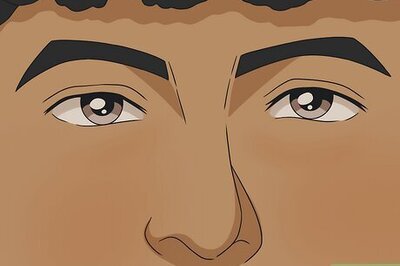
views
Spiritual Meanings of a Dragon
Inner strength and power Dragons are symbols of ultimate might and wrath but also represent a responsibility to tame that power. As you work with dragon energy, learn to awaken your inner strength to meet whatever challenges you face. Get on the path to self-realization by mastering the dragon forces inside you. Western Europeans were obsessed with “slaying” dragons, but you can instead tame their power to best serve you in life.
Spiritual guidance and wisdom Dragons remind us that divinity exists in all things. As dragons guide you towards success, it’s important to remember that they also guide you toward enlightenment. In the ancient world, it was believed that dragons existed spiritually within landscapes on the earth. Some Europeans believed that dragons actually lived inside mountains and other forms of land.
Transformation and change Encountering a dragon as a spirit animal means you’re about to go through some kind of change. The change may involve shifting beliefs or behaviors internally or finding a new job, home, or relationship externally.
Balance of energies Dragons are an example of polarities at work. They have been considered a force of good in Eastern culture and a source of evil in Western culture. Dragons as symbols force you to consider the good and evil energies inside yourself. Think about how you use the yin-yang energies inside you. Are your opposites balanced or are you looking at a situation in a one-sided way? Dragons allow us to meet ourselves in the center and remain aware of balance within ourselves.
Protection Dragons are thought of as guardians who protect the treasure. This meant a literal treasure of gold in Western culture, but deciphers dragons as guardians of enlightenment in Eastern culture. On the flip side of protection is greed. Dragons who guard a treasure can sometimes be seen as hoarding it, to remind us not to give into greed or over-protection in ourselves.
Mystery and magic Dragons are mythical creatures that symbolize the magic of everyday life. Use this energy to embrace the more mystical side of life, whether that means starting a dream journal, learning a new meditation practice, or embarking on a spiritual journey.
Types of Dragons
Different colored dragons have different meanings in Eastern culture. A red dragon is most commonly linked to good luck and fortune. A white dragon stands for purity and virtue, while a black dragon represents evil or revenge. A green or blue dragon signals spring and new life, while a yellow or golden dragon means prosperity, power, and good fortune.
Dragons symbolize different natural elements. This idea comes into play if you are connected to a dragon appearing in the water, among trees, on the earth, or flying in the air. Water dragons speak to emotional rhythms. Many dragon characters are ocean dwellers, who can teach us to go with the flow more. They link us to the deeper unconscious, intuition, and our feminine wisdom. Work to make your inner unconscious part of your everyday reality with the motion of water. Earth dragons stand for ancient earth energy. They are associated with eternal wisdom and mastery over time. Connect to your earth dragon by walking in the forest and reflecting on being solid and grounded in nature. Fire dragons signal passion and creative energy. Their home is usually inside a volcanic mountain or near the sun, where they keep the fiery energy of love and the heart with them. Air dragons can expand your spiritual horizons. They usually appear as winged creatures flying through the clouds. Air dragons assist you in ascending to a new perspective of thought or emotion without fear.
Cultural and Religious Meanings of a Dragon
Asian dragons are a benevolent symbol of good luck and prosperity. In Chinese mythology, Yandi, a tribal leader, is born out of a dragon's telepathy with his mother. Along with Huangdi, the grandson of a dragon, these emperors are China’s ancestors. The story goes that both Yandi and Huangdi became dragons after they died, which makes Chinese people “the descendants of dragons.” Dragons control water and weather in Chinese culture. Four “dragon kings” rule over water elements, like rivers, rainfall, waterfalls, and seas. Dragons are a sign of imperial authority in China. They were symbols for Chinese imperial leaders, who were called “sons of dragons.” Dragon imagery was not permitted to appear in other parts of society. The dragon is the 5th element in Chinese astrology. It’s associated with strength, good health, good luck, and male-yang energy. People born in the year of the dragon are typically intelligent, confident, powerful, charismatic, and have natural talents.
The European dragon is a malevolent force to be reckoned with. Unlike its Eastern counterpart, the medieval dragon in Western mythology stands for chaos and destruction and usually guards treasure or challenges that the hero (usually a knight) needs to overcome. In St. George and the Dragon, the knight rescues the princess after having to slay the dragon, which demands human sacrifice. Other English folk tales find dragons hiding treasure in a dark lair, to be found in mountains, caves, or lakes. The Red Dragon of Wales is an ancient symbol of Welsh resistance. Called “Y Ddraig Goch” in Welsh, it appears on the Welsh national flag. This dragon dates back to the 7th-century King Cadwaladr of Gwynedd, who carried its image into battle against the Saxons.
Apep is an ancient Egyptian serpent dragon in the land of the dead. Other Egyptian dragon figures include the ouroboros, a serpent dragon who eats its tail.
The drakaina is a female dragon in ancient Greek mythology. She has the features of a human woman but is not alone in Greek folktales about dragons. There is a long history of Greek heroes fighting dragons: Heracles and the Lernaean Hydra, Jason and a dragon who guarded the Golden Fleece, and Cadmus against the dragon of Ares.
Native American dragons are found on both land and sea. They existed in caves and also appeared as winged creatures flying through the sky. The Algonquin Piasa, called the “bird dragon,” has elk’s horns, gold scales, bat-like claws, and feathery wings. This unusual dragon represents the supernatural power of the Underworld.
The French Le Drac is a dragon who is sometimes werewolf-like. Le Drac lived near the Viaur River in France and was an evil figure thought of as the Devil’s son.
Dragons signal chaos in the Bible. They are a kind of spiritual darkness that needs to be conquered. God defeats a sea dragon in the Book of Genesis, while Daniel meets a dragon slayer who can destroy dragon-like monsters threatening humankind in the Book of Daniel.
The Incan Amaru dragon guards South American waters. Also called the rainbow dragon, this serpent-dragon figure is a shapeshifter known for its wisdom to guide shamans in spiritual practices.
Personal Transformation Through Dragon Symbols
Embracing your inner dragon can lead to personal transformation. What part of your ego do you associate yourself with? Your higher self connects to the divine, while your lower ego is more interested in survival. Dragons can inspire us to use power destructively or to channel power for a higher good. Dragon personalities are known for being fearless, natural leaders with a protective nature. They’re confident, courageous, and unafraid of change or challenge. Take the opportunity to embrace power in your life, confront challenges, and seek wisdom, just like dragons do as spiritual guides. Connect to your dragon totem figure by speaking out loud, creating drawings, and collecting dragon images (or get a dragon tattoo!) Through these methods, dragons can encourage you to express yourself at full volume.
Dream Meanings of a Dragon
Pay attention to the context in which dragons appear in your dreams. Does their presence give you a positive or negative association? The specific dream you have affects the overall message a dragon dream figure has to share. Dragon dreams call to mind themes of strength, courage, and unseen forces at work in our lives, usually focused on transformation or evolution. A threatening dragon could mean inner conflict, while a friendly one connects to mastering fears or new challenges. Reflect on guardianship in your life. The dragon is a protector, so ask yourself what you need during this phase of life, who you can trust, and how best to protect your energy from negative influences.
Is a Dragon a Good or Bad Omen?
Eastern Dragons are considered signs of good luck and fortune. They are a huge part of traditional Chinese New Year celebrations and are considered a benevolent symbol for a year filled with prosperity and wealth.
Western European dragons are associated with bad omens, evil, and even the devil. They are symbols that guard treasure, breathe fire, and need to be defeated by angels or knights. The good or bad omen depends on which dragon you connect to most, but dragons as bringers of good fortune is a tradition that is still celebrated today.




















Comments
0 comment